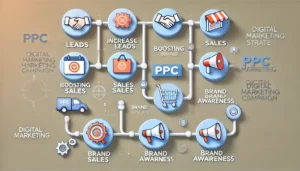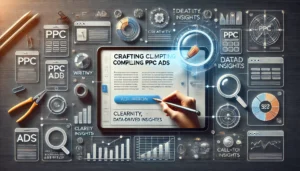How Effective is PPC Marketing? A Deep Dive

How Effective is PPC Marketing? Pay-Per-Click (PPC) marketing is a key part of digital advertising. It helps businesses reach their target audience quickly and effectively. This article will explore how PPC marketing works and its benefits. We’ll also look at how to set goals, choose keywords, create ads, and measure success.
Key Takeaways
- PPC marketing offers quick visibility and results, making it ideal for businesses needing immediate impact.
- Highly targeted advertising ensures that your ads reach the right audience, increasing the chances of conversions.
- PPC campaigns are measurable and trackable, allowing businesses to see exactly how their money is being spent.
- Keyword research is crucial for the success of PPC campaigns, helping to target the most relevant search terms.
- Continuous monitoring and optimisation are essential for maintaining the effectiveness of PPC campaigns.
How Effective is PPC Marketing? Understanding the Basics
What is PPC Marketing?
Pay-Per-Click (PPC) marketing is a digital advertising model where advertisers pay a fee each time their ad is clicked. It’s a way to buy visits to your site rather than earning them organically. PPC is like an auction where advertisers bid for ad placement in a search engine’s sponsored links when someone searches on a keyword related to their business.
How Does PPC Work? (How Effective is PPC Marketing?)
In PPC, advertisers bid on keywords they believe their target audience will use. When a user types in those keywords, the search engine processes the auction and displays the winning ads. The advertiser then pays a fee each time their ad is clicked. This model ensures that your ads are shown to users actively searching for your products or services.
PPC is not a set-and-forget strategy. It requires continuous monitoring and optimisation to ensure the best results.
Common PPC Platforms
Several platforms offer PPC advertising, each with its unique features:
- Google Ads: The most popular PPC platform, allowing ads to appear on Google search results and other Google properties.
- Bing Ads: Similar to Google Ads but for the Bing search engine.
- Social Media Platforms: Facebook, Instagram, LinkedIn, and Twitter offer PPC options to target users based on their social media activity.
Choosing the right platform depends on your target audience and marketing goals.
How Effective is PPC Marketing? Knowing The Benefits
Immediate Results and Visibility
One of the standout benefits of PPC marketing is the immediate results it delivers. Unlike organic SEO, which can take months to show impact, PPC ads start driving traffic to your website as soon as the campaign goes live. This is particularly beneficial for businesses looking to make a quick impact, such as during a product launch or a special promotion.
Highly Targeted Advertising (How Effective is PPC Marketing?)
PPC allows for highly targeted advertising. We can tailor our ads to reach specific demographics, locations, and even user interests. This ensures that our ads are seen by the right people, increasing the chances of conversion. For instance, a London PPC agency can target ads specifically to users in London, making the campaign more effective.
Measurable and Trackable Outcomes
One of the most attractive aspects of PPC is its measurability. We can track every click, impression, and conversion, giving us a clear picture of our campaign’s performance. This data is invaluable for making informed decisions and optimising future campaigns. Working with a PPC ecommerce agency can further enhance these benefits by providing specialised insights and strategies.
PPC marketing offers a treasure trove of performance insights, helping us understand exactly how our campaigns are faring.
In summary, PPC marketing offers immediate visibility, highly targeted advertising, and measurable outcomes, making it a powerful tool in our digital marketing arsenal.
How Effective is PPC Marketing? Setting Clear Objectives for PPC Campaigns
Defining Your Goals
Before we dive into the data, it’s crucial to define what success looks like for our PPC campaigns. Are we aiming to increase leads, boost sales, or improve brand awareness? Having clear goals sets the direction for our analysis and ensures that every pound spent contributes to achieving our marketing objectives.
Aligning PPC with Business Objectives (How Effective is PPC Marketing?)
Our PPC goals should align with our broader business objectives. For instance, if our business goal is to increase revenue by 20%, our PPC objective might be to increase the number of new customers acquired through PPC campaigns by 40%. This alignment ensures that our PPC efforts are not just isolated activities but are integrated into our overall business strategy.
Measuring Success
To measure success, we need to identify the key performance indicators (KPIs) that will indicate progress toward our goals. For example:
- If our goal is to enhance brand visibility, KPIs such as impressions, reach, and click-through rate (CTR) become crucial.
- For campaigns aimed at generating leads, conversion rate and cost per lead (CPL) are pivotal.
- For direct sales campaigns, return on ad spend (ROAS) and cost per acquisition (CPA) are key indicators of success.
It’s important to recognise that KPIs are not static and should be revisited regularly to ensure they remain relevant to our goals.
Establishing a framework for PPC analysis ensures that our efforts are structured, goal-oriented, and capable of delivering actionable insights.
How Effective is PPC Marketing? Keyword Research and Selection
Importance of Keyword Research
Keyword research is the backbone of any successful PPC campaign. It helps us understand what our audience is searching for and how we can meet their needs. By identifying the right keywords, we can ensure our ads appear in front of the right people at the right time. Effective keyword research can significantly improve our online visibility and drive more traffic to our site.
Tools for Keyword Research (How Effective is PPC Marketing?)
There are several tools available to help us with keyword research. Some of the most popular ones include:
- Google Keyword Planner: A free tool that provides keyword ideas and traffic estimates.
- SEMrush: A comprehensive tool that offers keyword research, competitor analysis, and more.
- Ahrefs: Known for its robust backlink analysis, it also offers excellent keyword research capabilities.
Using these tools, we can find high-traffic, relevant keywords that align with our business goals.
Selecting the Right Keywords
Choosing the right keywords is crucial for the success of our PPC campaigns. We need to consider factors like search volume, competition, and relevance to our business. It’s also important to use a mix of broad, phrase, and exact match keywords to reach a diverse audience. By carefully selecting our keywords, we can maximise our ad spend and achieve better results.
Remember, the goal is to strike a balance between keyword volume and relevance. Overstuffing your content with keywords can be detrimental, while a lack of keywords might render your ads invisible.
How Effective is PPC Marketing? Crafting Compelling PPC Ads
Creating effective PPC ads is both an art and a science. We need to blend creativity with data-driven strategies to capture our audience’s attention and drive conversions. Let’s explore how to craft compelling PPC ads.
Writing Effective Ad Copy
The foundation of any successful PPC campaign is effective ad copy. Our words need to be clear, concise, and persuasive. We should focus on the benefits of our product or service and include a strong call-to-action. Remember, the goal is to make the user want to click on our ad.
Using Ad Extensions (How Effective is PPC Marketing?)
Ad extensions are a powerful tool that can enhance our ads by providing additional information. These can include site links, call buttons, or location information. By using ad extensions, we can make our ads more informative and increase their visibility on search engines.
Creating Engaging Visuals
Visuals play a crucial role in capturing attention. Whether it’s an image or a video, our visuals should be relevant and engaging. They need to complement our ad copy and reinforce our message. High-quality visuals can significantly improve our ad performance.
Crafting compelling PPC ads requires a mix of creativity and strategic thinking. By focusing on effective ad copy, utilising ad extensions, and creating engaging visuals, we can create ads that not only attract clicks but also drive conversions.
How Effective is PPC Marketing? Optimising Landing Pages for PPC
Designing for Conversion
When it comes to PPC campaigns, the landing page is where the magic happens. It’s crucial to design your landing pages with conversion in mind. This means having clear and effective call-to-actions (CTAs), persuasive messaging, and a layout that guides the user towards taking the desired action. A well-designed landing page can significantly boost your conversion rates.
Ensuring Relevance to Ads (How Effective is PPC Marketing?)
Your landing page must be relevant to the ad that brought the user there. If a user clicks on an ad for a specific product, they should land on a page about that product, not a generic homepage. This relevance helps in maintaining user interest and reducing bounce rates. Consistency between your ad and landing page content is key to keeping users engaged.
A/B Testing Landing Pages
A/B testing is a powerful tool for optimising your landing pages. By testing different versions of your landing page, you can identify which elements perform best. This could include variations in headlines, images, CTAs, or even the overall layout. Regular A/B testing allows us to continually improve our landing pages and maximise conversions.
Remember, the goal of your landing page is to convert visitors into customers. By focusing on design, relevance, and continuous testing, we can create landing pages that not only attract but also convert.
How Effective is PPC Marketing? Monitoring and Analysing PPC Performance
Key Performance Indicators (KPIs)
To effectively monitor PPC campaigns, we need to focus on several key performance indicators (KPIs). These metrics help us understand how well our campaigns are performing and where we might need to make adjustments. Some essential KPIs include:
- Click-Through Rate (CTR): This measures the percentage of people who click on our ad after seeing it. A high CTR indicates that our ad is relevant and engaging.
- Cost Per Click (CPC): This tells us how much we’re paying for each click on our ad. Keeping CPC low while maintaining high-quality traffic is crucial.
- Conversion Rate: This shows the percentage of visitors who complete a desired action, such as making a purchase or signing up for a newsletter.
- Return on Ad Spend (ROAS): This metric helps us understand the revenue generated for every pound spent on our PPC campaigns.
Using Analytics Tools (How Effective is PPC Marketing?)
Analytics tools are vital for tracking and analysing PPC performance. Tools like Google Analytics and specialised PPC dashboards provide detailed insights into our campaigns. They allow us to monitor metrics in real-time and make data-driven decisions. For instance, a sudden spike in CPC without a corresponding increase in conversion rate may indicate our campaign is becoming cost-inefficient, and it’s time to stop the campaign.
Adjusting Campaigns Based on Data
The most important step in real-time PPC analysis is acting on the findings. Understanding what specific metrics or changes signal the need for action is crucial for maintaining campaign health and optimising performance. Here are some examples:
- A declining CTR, especially on ads that previously performed well, often signals creative fatigue. Before audience disengagement impacts our campaign’s effectiveness, refreshing ad visuals and copy can reinvigorate interest and improve engagement rates.
- If our campaign’s conversion rate begins to falter while CTR remains high, it might be time to revisit our targeting parameters. This discrepancy can indicate that while our ads are compelling, they’re not reaching the most qualified prospects.
Conducting a thorough post-campaign analysis is crucial for understanding the effectiveness of our marketing efforts and laying the groundwork for future success.
By regularly monitoring these KPIs and using analytics tools, we can ensure our PPC campaigns remain effective and aligned with our business goals.
How Effective is PPC Marketing? The Role of A/B Testing in PPC
What is A/B Testing?
A/B testing, also known as split testing, is a method where we compare two versions of an ad to see which one performs better. This technique helps us understand what resonates most with our audience. By testing different elements like headlines, images, and calls to action, we can optimise our ads for better performance.
Implementing A/B Tests (How Effective is PPC Marketing?)
To start with A/B testing, we need to create two versions of an ad. These versions should differ in only one element to ensure accurate results. For example, we might change the headline in one version while keeping everything else the same. Once the ads are live, we monitor their performance to see which one gets more clicks or conversions.
Steps to implement A/B testing:
- Identify the element to test (e.g., headline, image).
- Create two versions of the ad with one differing element.
- Run both ads simultaneously to a similar audience.
- Analyse the performance data to determine the winner.
- Implement the winning version and consider further testing.
Interpreting Test Results
After running an A/B test, it’s crucial to analyse the results carefully. Look at metrics like click-through rate (CTR), conversion rate, and cost per conversion. A significant difference in these metrics can indicate which version is more effective. However, it’s essential to run the test long enough to gather sufficient data for reliable conclusions.
A/B testing is a continuous process. Even after finding a winning ad, we should keep testing new elements to further improve our campaigns.
By regularly conducting A/B tests, we can ensure our PPC campaigns remain effective and relevant. This approach not only helps in optimising ads but also provides valuable insights into our audience’s preferences.
How Effective is PPC Marketing? Integrating PPC with Other Marketing Strategies
PPC and SEO Synergy
The interplay between PPC and SEO is not a battle but a powerful alliance. When we navigate through analytics, we can create more targeted campaigns and achieve higher conversion rates. By aligning our PPC campaigns with our content marketing strategy, we create a seamless user experience that enhances conversion potential. It’s not about choosing one over the other; it’s about combining them for maximum impact.
Combining PPC with Content Marketing (How Effective is PPC Marketing?)
By integrating Google Adwords PPC with SEO and content marketing, we create a unified front that elevates our online presence and conversion potential. This synergy is not just about consistency in messaging but also about leveraging insights across various channels for more informed decision-making. Here’s how the integration can amplify our marketing efforts:
- Insights from SEO can inform PPC campaign adjustments.
- Content marketing consistency boosts ad relevance and user engagement.
- Analysing ROI across channels helps allocate budgets more effectively.
Using PPC Data to Inform Other Channels
Integrating PPC data with insights from other marketing channels provides even more food for thought and allows for a comprehensive understanding of marketing performance. For instance, combining PPC and web analytics data unveils conversion paths, revealing the sequences of interactions that lead to conversions. This integrated view helps identify the most effective pathways and potential friction points within the user experience. If users from PPC campaigns are consistently dropping off at a particular stage in the funnel, this could indicate areas where the website fails to meet the expectations set by the ad or where the user experience needs improvement.
How Effective is PPC Marketing? Learning the Common Challenges
Managing Budget Effectively
One of the biggest hurdles in PPC management is handling the budget effectively. It’s easy to overspend if we don’t keep a close eye on our campaigns. We need to set clear budget limits and monitor our spending regularly. Using PPC automation tools can help us find the best bids and target the right audience, ensuring we get the most out of our budget.
Dealing with Click Fraud (How Effective is PPC Marketing?)
Click fraud is another significant challenge. This happens when people or bots click on our ads with no intention of buying anything. It can drain our budget quickly. To combat this, we should use advanced analytics tools to detect unusual click patterns and block suspicious IP addresses. This way, we can protect our campaigns from fraudulent activities.
Staying Updated with Platform Changes
PPC platforms like Google Ads and Facebook Ads are constantly evolving. New features, policies, and algorithms are introduced regularly. Keeping up with these changes is crucial for maintaining the effectiveness of our campaigns. We should stay informed by following industry blogs, attending webinars, and participating in forums. This will help us adapt our strategies and stay ahead of the competition.
Staying updated with platform changes is essential for maintaining the effectiveness of our campaigns. By following industry blogs and participating in webinars, we can adapt our strategies and stay ahead of the competition.
How Effective is PPC Marketing? Future Trends in PPC Marketing
Automation and AI in PPC
Automation and AI are transforming PPC marketing. These technologies help us manage campaigns more efficiently by automating repetitive tasks. AI can analyse data faster than any human, providing insights that can improve our strategies. However, it’s crucial to maintain strategic oversight to ensure our campaigns align with our marketing objectives.
The Rise of Voice Search (How Effective is PPC Marketing?)
Voice search is becoming more popular with the increasing use of smart speakers and voice assistants. This trend means we need to adapt our PPC strategies to include voice search optimisation. Keywords and phrases used in voice searches are often different from text searches, so we must adjust our keyword research accordingly.
Evolving Consumer Behaviour
Consumer behaviour is always changing, and we must stay ahead of these changes to remain effective. By analysing user interaction trends, we can pinpoint the optimal times to display ads, thereby investing our budget more strategically and increasing the likelihood of meaningful engagement.
Adaptation is our watchword. As the digital environment evolves, so too must our strategies. Those who can pivot with the changing tides of technology and consumer behaviour will not only survive but flourish.
The future of PPC marketing is bright and full of exciting changes. With new technologies and strategies emerging, businesses have more opportunities than ever to reach their target audience. Don’t miss out on these trends! Visit our website to learn more and get a free PPC audit today.
Conclusion
In conclusion, PPC marketing stands out as a highly effective tool in the digital marketing arsenal. It offers businesses the ability to reach their target audience quickly and measure the impact of their campaigns in real-time. By setting clear objectives, conducting thorough keyword research, and continuously optimising campaigns, businesses can achieve significant results. PPC is not just about driving traffic; it’s about attracting the right kind of traffic that converts into leads and sales. As the digital landscape evolves, staying updated with the latest trends and best practises in PPC will ensure sustained success. For businesses ready to invest time and resources, PPC marketing can unlock substantial growth and long-term benefits.
Frequently Asked Questions
What is PPC marketing?
PPC, or Pay-Per-Click, is a type of online advertising where businesses pay a fee each time someone clicks on their ad. It’s a way to buy visits to your site rather than earning them organically.
How does PPC work?
PPC works by placing ads on search engines or social media platforms. Advertisers bid on keywords, and when someone searches for those terms, the ads may appear. You only pay when someone clicks on your ad.
What are the common PPC platforms?
Popular PPC platforms include Google Ads, Bing Ads, Facebook Ads, and Instagram Ads. Each platform has its own strengths and can be used to reach different audiences.
What are the benefits of PPC marketing?
PPC marketing offers quick results, targeted advertising, and measurable outcomes. You can see how well your ads are performing and make adjustments in real-time.
How do I choose the right keywords for my PPC campaign?
Start with keyword research using tools like Google Keyword Planner. Look for keywords that are relevant to your business, have good search volume, and low competition.
What makes a good PPC ad?
A good PPC ad is clear, concise, and relevant to the user’s search. It should have a strong headline, a compelling call-to-action, and use ad extensions to provide additional information.
How can I improve my landing page for PPC?
Ensure your landing page is relevant to the ad, easy to navigate, and designed for conversion. Use A/B testing to find out what works best and make continuous improvements.
What are some common challenges in PPC marketing?
Common challenges include managing your budget, dealing with click fraud, and keeping up with changes in PPC platforms. Staying updated and continuously optimising your campaigns can help overcome these challenges.
Author
Search Blog
Free PPC Audit
Subscribe to our Newsletter
The Voices of Our Success: Your Words, Our Pride
Don't just take our word for it. With over 100+ five-star reviews, we let our work-and our satisfied clients-speak for us.
"We have been working with PPC Geeks for around 6 months and have found Mark and the team to be very impressive. Having worked with a few companies in this and similar sectors, I rate PPC Geeks as the strongest I have come across. They have taken time to understand our business, our market and competitors and supported us to devise a strategy to generate business. I value the expertise Mark and his team provide and trust them to make the best recommendations for the long-term."
~ Just Go, Alasdair Anderson




